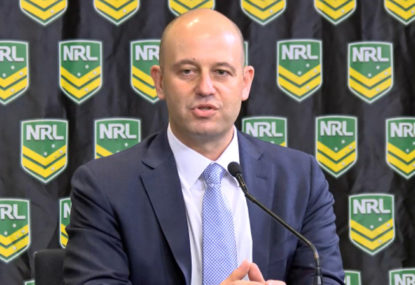Flashback to the 1995 Australian Rugby League season, which was celebrated as the 88th year of professional rugby league competition in Australia.
That year, the grand final was played between the Sydney Bulldogs and Manly-Warringah Sea Eagles. The Bulldogs finished sixth at the end of the regular season and then won three sudden death matches in a row to make the grand final.
Their opposition, Manly-Warringah, were the favourites going into the game, having won the JJ Giltinan Shield weeks earlier.
The Sydney Bulldogs won that grand final 17-4, Jimmy Dymock was awarded the Clive Churchill Medal and Terry Lamb was able to retire as a victorious captain, but not before he raised the Winfield Cup above his head one more time.
At the conclusion of the 1995 season, along with Terry Lamb, the Winfield Cup was retired. Winfield was no longer able to sponsor the Australian rugby league following the introduction of new laws which outlawed tobacco advertising in Australian sport.
Twenty years later, the presence of Winfield may have disappeared from our game, but for me, there is another type of sponsor whose presence is even more visible.
For me, the product this particular sponsor sells and promotes has the capacity to be just as damaging as the tobacco products, whose presence was ultimately seen as necessary to remove from sport. That sponsor is the betting agency.
Last week, the rugby league world was rocked (again) as it was announced that the Organised Crime Squad from the NSW police had launched an investigation into claims of match-fixing.
At this stage, we have little more than allegations and scuttlebutt, but it is understood that the two matches under investigation are the 2015 matches between Manly and Souths (Round 16) and Manly and Parramatta (Round 24). It has been reported that Eddie Hayson, a former brothel owner and gambler, has become involved.
The NRL responded swiftly and assured the Australian public that they were cooperating with the authorities. CEO Todd Greenberg later confirmed that any player found guilty of match-fixing would be given a lifetime ban from the game.
All this has occurred in a context, however, where the NRL and certain clubs benefit so significantly from their association with gambling companies. You cannot attend an NRL game without seeing the names of betting agencies on the big screens and on the sleeves, shorts and front of club jerseys or watch a game on television without seeing countless advertisements and updates on the odds during the telecast. Was anyone else surprised by this underlying alleged gambling culture?
This is not the first time this has happened either. I remember being particularly troubled when Pepper Stadium was renamed Centrebet Stadium while a police investigation continued into the gambling scandal involving Ryan Tandy. I feel similarly troubled at the moment.
There is nothing wrong with having a punt. But Australia’s gambling culture has evolved into so much more than that. Gone are the days where it used to be a novelty to have a flutter on the Melbourne Cup every year. Millions of dollars will be bet on any given NRL match on the weekend.
You can place bets on the head-to-head result, how many line breaks a player will make, who will be first try scorer – you name it, it is available. It seems that you cannot escape the game’s association with betting agencies.
So the question is what do we do about it if anything at all?
Do we need to be as extreme as to say that there should be a ban on the NRL and the clubs from being sponsored or associated with betting agencies?
This is a step that has already been taken in other sports. Several AFL clubs including Essendon, Collingwood, Hawthorn and the Western Bulldogs have agreed not to enter into commercial agreements with betting agencies and have implemented a code of practice at any gaming venues. North Melbourne have taken it one step further by refusing to take any gambling revenue, including pokies.
A ban would mean that many clubs would lose significant revenue but the AFL clubs have demonstrated that survival is possible.
This goes back to my initial story about the Winfield Cup. At one point in Australian sporting history we thought that the end of tobacco companies being able to sponsor teams would see catastrophic effects. Instead of having catastrophic effects, we have seen teams find other sources of revenue and sponsorship of sport continuing to grow. Something else has arrived to plug that gap.
I want to see our clubs encouraged to find alternate sources of revenue raising. Promote the capacity that sport has to drive and influence change in the community and the powerful work that our NRL clubs do through the NRL community program. If these programs are not worthy of funding and support, then I don’t know what is.
I know that in the end, the mighty dollar wins. Sponsorship is absolutely the most secure form of revenue a club can have. In an environment where crowds and membership numbers can change depending on how your team performs on the field, the funds derived from sponsorship become even more important.
But I am convinced we can do better. Next time I see allegations of match-fixing in my sport (and I hope that it never happens again), I would prefer not to see a betting advertisement underneath the story, encouraging me to ‘gamble responsibly’.
This is @mary__kaye from @ladieswholeague.





























































































